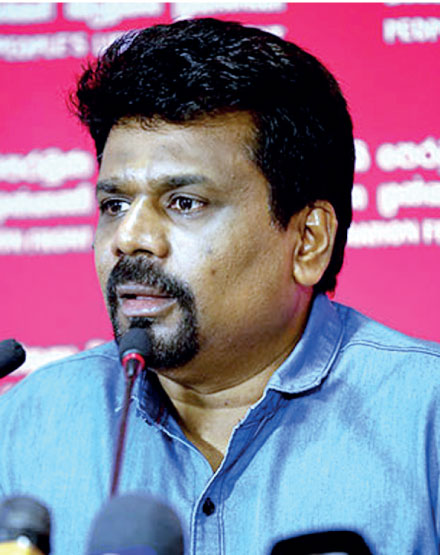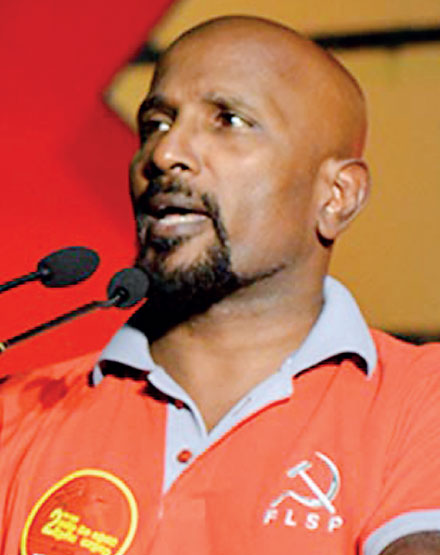Monday Feb 16, 2026
Monday Feb 16, 2026
Monday, 9 May 2022 00:27 - - {{hitsCtrl.values.hits}}

JVP Leader Anura Kumara Dissanayake

FSP Leader Kumar Gunaratnam
 Any meaningful and lasting solution to the current economic crisis has to come not simply by restoring macroeconomic stability but more importantly and fundamentally by restructuring the economy. This structural approach had been overlooked by all previous governments except under the leftist coalition of Sirimavo Bandaranaike in 1970s, which ended in disaster for a number of reasons among which an absence of pragmatism played a key role.
Any meaningful and lasting solution to the current economic crisis has to come not simply by restoring macroeconomic stability but more importantly and fundamentally by restructuring the economy. This structural approach had been overlooked by all previous governments except under the leftist coalition of Sirimavo Bandaranaike in 1970s, which ended in disaster for a number of reasons among which an absence of pragmatism played a key role.
Once again structural issues are conveniently ignored in the diagnosis presented by the Minister of Finance in his address to the Parliament. It was more like a tutorial submission by a student in neoliberal economics taught by IMF than a thorough understanding of the structural problems that had bedevilled the economy for decades. For instance, what has changed in the economic structure of the country since the British left, except the growth of a few small and medium size industries struggling to survive with yesterday’s technology and preferential tariffs from EU, and a tourist sector hit by the pandemic and prevailing political chaos? The minister’s diagnosis only scratched the surface of the wound and not the bacteria that is lying deep in the body.
It is a global phenomenon that since the advent of economic neoliberalism, financialisation of economies had run amok diverting resources from the real sector towards the financial sector, leaving the latter with excess capacity and under production. It is this resource diversion that had particularly hit food production in several developing countries. In Sri Lanka too the financial sector has grown faster than the real sector since 1977 under JR’s open economy leaving the real sector deprived of productive resources. Wrong priorities, misplaced incentives and policies on the run by governments in power had crippled the country’s food production and that of other productive sectors.
Tackling such structural dislocation would involve political confrontation with existing power relations. None of the present political parties except JVP and FSP have even a semblance of an agenda to face this confrontation? The call for a systemic change is epicentral to all public protests that have become a daily occurrence. Unless that change is brought about there is no permanent solution to the country’s economic agony.
The present regime has totally destroyed even the little strength that the economy had through reckless mismanagement, loot, corruption and waste. This is why aragalaya demands the regime to pack up and leave the Parliament immediately. But the President has declared emergency for a second time as a last ditch to protect his crumbling fortress. Like the first, this emergency too will fail unless he is willing allow rivers of blood to flood the Galle Face Green.
Unlike the youngsters of previous decades who were driven by political romanticism, this generation, thanks to the network world of instant information, cannot be bought by false promises and threatened with force. If President Gotabaya thinks that their struggle could be put down by his gendarmerie let him think twice. He will plunge this country into an even more serious crisis. It looks that the Government and the parties in Opposition except JVP have still not grasped the maturity, sentiments and resilience of the generation of protestors that is occupying the Galle Face Green and other city centres in the country.
Fiscal reforms, sustainable debt levels, budget discipline, flexible exchange rates, tight monetary policy, etc. are ready made prescriptions contained in a typical IMF reform package. Even if these reforms were to be implemented in full unless the country’s real sector takes off there is less hope for sustainable economic revival. A primary condition for such revival is political stability.
In one of my previous contributions to this journal I alluded to the final stage of what took place in Tahrir Square in Cairo. I am afraid that GR is trying to replicate that experience in Sri Lanka. However, unlike Cairo where anti-Mubarak protestors did not have support from any political party inside the legislature, except the Muslim Brotherhood, which had a different agenda, aragalaya has support inside the Parliament such as from JVP and other progressives from other parties.
Outside the Parliament too there are civil society leaders, intellectuals and religious leaders who would not tolerate Government’s highhanded actions to suppress the protests. There is also a vibrant expatriate society willing to lend active support to the ongoing struggle. Hence, GR would have to face a hostile world opinion. Is he going to challenge the whole world for a confrontation? His stupidity will certainly jeopardise even the IMF effort to lend support to the economy. Let those who are supposed to inject virtuosity allow sanity to prevail to save the nation.
Rajapaksa regime is living on borrowed time. Sooner it goes better for the country. But what is the alternative? Economy no doubt is the immediate concern. Dollar crisis has to be eased with added urgency to make living a little more comfortable to the masses. IMF assistance is a must, and CBSL with its new chief who has a proven record of expertise has to play an independent and heroic role. All that should however go hand in hand with structural reforms to the economy, which will entail fundamental changes in power relations. That requires a political regime with a progressive plan to spearhead those changes. From the stock of political parties that the country has at present, a broad coalition led by JVP + FSP promises the only way forward.
(The writer is attached to Murdoch Business School, Murdoch University, Western Australia.)